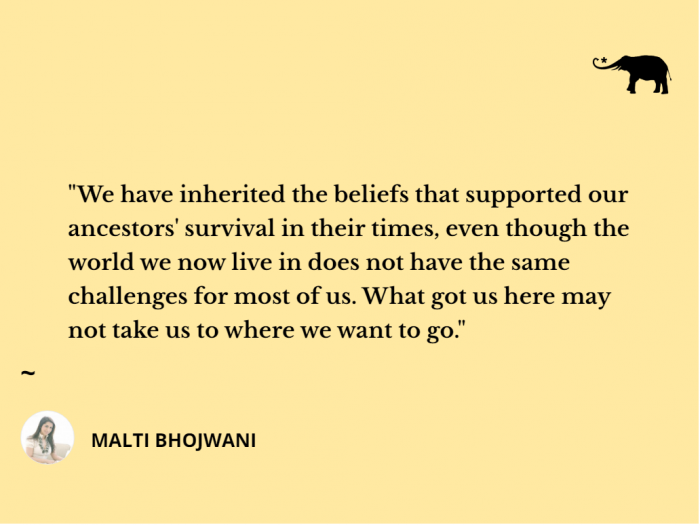~
The following is an excerpt from Mastering Your Life, written by Malti Bhojwani.
*Editor’s Note: Here at elephant, we’re notorious bookworms—we love them, and want you to love them, too. But, recently, we found out books are evil—one of the worst things for the environment. Before you buy your next book, read this and this. Keep reading, but read responsibly.
~
“You never change things by fighting the existing reality. To change something, build a new model that makes the existing model obsolete.” ~ Buckminster Fuller
~
Mastery is not a destination we get to, but rather a path.
Mastery requires the humility to know that you never really “get” there, but you stay on course.
The switch for me shifted from being a victim of other people and life circumstances to becoming a master of my own choices and life. It takes courage, immense courage, to make choices that are not aligned with societal norms, with what is considered normal. But I felt internally guided, and I was able to take that leap of faith, the path of the so-called deviant, even when I could not see what the road ahead was going to look like.
I chose adventure and freedom over stability and security. And I had many challenges and failures—failed relationships that broke my heart, rejections from job interviews, potential clients, editors, and publishers that hurt my confidence. Countless business ventures that didn’t work out, getting caught in scams that shattered my trust in my ability to make sound decisions.
I woke up many mornings on tear-drenched pillowcases, still gripping a phone that didn’t ring—one failure and heartache after another. I felt deep anguish, desperation, and hopelessness.
But because somewhere inside, I knew that I was creating what seemed like losses around me, I knew that I could choose to create a different reality. I had just started to believe that I was worthy of greatness and that the “show wasn’t over yet.” This inner knowledge gave me the strength to get back up each time and continue to pursue happiness.
I took the lessons from the previous failures and tried again and again. And guess what? I failed again.
Often, I would go back to feeling small, like I wasn’t worthy. I was not good enough. This was never going to work. Who did I think I was that I was going to break out of this cycle? How could fat little me even try to create a life that I desired? Who did I think I was?
But I found the wisdom to stop the incessant broken record of limiting thoughts, and I realised that I get to choose the next “playlist.” I could consciously choose to believe that I am worthy by virtue of the fact that I am alive. We were not put on this planet to suffer, and we were not put on this planet to feel undeserving of joy.
When we were born—in fact, at the moment of our conception—we received all the sustenance we needed through our mothers’ wombs. And we didn’t have to earn it. We didn’t have to work for it. It was ours, our birthright. But we need to wake up to it and own it. No amount of achievement, no new relationship, promotion, or degree, no other level of success or dollars in the bank will make us feel worthy; only we can choose to embrace this truth and step into our worthiness. Only we can decide that we are worthy because we are alive. We are entitled to miracles.
The map is not the territory, but a map is still an excellent way to understand the terrain.
We view the world, our options, and ourselves through filters, and what’s not helpful about it is most of us don’t even know that we are looking through these filters.
Our beliefs are these filters. We inherited some beliefs about ourselves and how to navigate life in utero and formed some of them when we were really young, even before we had the proper vocabulary to describe them. Some of them have worked for us up to a certain point, but if we genuinely want to transform our lives, we need to be able to see clearly what beliefs have been running our lives until now and how can we break them, let light shine through them, and reframe the ones that have passed their “use-by” date. We need to reassess their validity.
Epigenetics studies explain how our beliefs and ingrained strategies to cope with life’s stresses may have been “pre-programmed” and inherited through our DNA. Traditional genetics describes how the DNA sequences in our genes are passed from one generation to the next; epigenetics describes the passing down of the way genes are used—through chemical tags attached to our DNA.
So essentially, we have inherited the beliefs that supported our ancestors’ survival in their times, even though the world we now live in does not have the same challenges for most of us. What got us here may not take us to where we want to go.
Let me share an example from my ancestry.
I have heard stories of how my maternal grandfather climbed the steep rope ladder on the side of a ship as it left the Indian shores in the possibility of finding “greener pastures.” He docked in China and managed to amass great wealth. Similarly, my paternal family fled India to settle in Singapore and struggled in the early days to make a living. As you can see, my ancestors inadvertently may have passed down courage on the one hand but also the mindset of lack. They lived in a “trance of scarcity,” with a philosophy that “there is never enough.” It’s no surprise that they lived their lives in fierce competition, mistrust, saving, and hoarding.
In a way, their inherited belief systems allowed them to survive, propagate, and us to be born in the first place; it got us here—alive now. The irony is that they worked hard so that we wouldn’t have to face their plight.
Formed pre-birth and in our childhood, many of us go through our lives reinforcing our beliefs. That’s what people call a self-fulfilling prophecy. An example of that would be when I had a belief that “life is hard” or that “money is the root of evil”—how, then, do you think my life experience panned out? How open was I to attracting wealth? If I had a belief that “you just can’t trust people,” then my first instinct would be to mistrust anyone who came into my life. The need to be right about my beliefs would attract circumstances that confirmed them.
When will you decide to reject the life sentences of our forefathers—to suffer and just survive—and instead subscribe to the wisdom that you can let it go and thrive in this lifetime?












Read 0 comments and reply